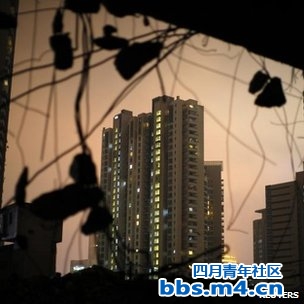http://www.bbc.co.uk/news/world-asia-16009050

You only have to look at the Beijing sky-line to realise how key construction has been to China's boom. As the gleaming skyscrapers, the fancy shopping malls, the towering apartment blocks have all gone up, property prices have risen with them.
They have increased at least fivefold in the last decade in cities across China, according to state media.
But in recent months, those in the property sector have gone from giddy to gloomy.
That is because property prices are beginning to fall and sales are down sharply.
Property developers are slashing prices by as much as a third in some new projects across the country.
Rules of the game
In some cases, this has led to protests from people who bought apartments only to see new buyers offered hefty discounts.
Some analysts, such as JP Morgan, believe the property market could drop by as much as 20% in the country's major cities within the next 12 to 18 months.
According to state media, there were only 1,000 sales of second-hand homes in Beijing in 2000. In contrast, there were over 200,000 sales last year.
With rising prices, property was always seen as a safe bet for many Chinese investors with few other places to put their money.
A lending boom following the global financial crisis in 2008 pushed prices up further.
Since last year, however, the authorities have taken measures to cool down the market such as restricting the number of properties individuals can buy and increasing the minimum down payment required on investments.
Part of the reason was to make housing more affordable. These measures are now biting.
No panic yet
But Patrick Chovanec - an economist based in Beijing - warns that the downturn could extend far beyond the property market.
"Property prices underpin almost all the lending that takes place in the Chinese economy," he said.
"China's economy has been driven in the last few years by lending.
"Just like the US and Europe, the ramifications of a housing market rising and falling extends far beyond construction and that proportion of the economy."
But property prices are not just about economics, they are also about confidence.
China's property prices are so high that they no longer make sense” For millions of Chinese, owning their home has become a symbol of success, that their lives are getting better.
Those without homes will welcome the drop as it may offer them a chance to get on the property ladder.
The Beijing branch of Swedish furniture giant Ikea is where many middle-class Chinese come to furnish their homes.
Outside the store, some expressed concern over falling prices.
"The property market is full of bubbles," said Liang Xiaoyu, 30, one of the customers.
"A drop in prices will probably be healthy. But if the market declines too much, it could cause problems for the economy."
There may not be outright panic yet but there is concern.
The worry is that the foundations of the world's second-largest economy may not be as firm as many thought.
End Quote Hu Jinhui vice-president, 5i5j group
"China's property prices are so high that they no longer make sense," says Hu Jinhui, vice president of 5i5j group, one of the country's largest real estate agencies. "We're seeing investors move out of the private property sector to the commercial sector or overseas property market. Smaller developers face becoming bankrupt," he said.
"The property sector will remain a major sector in Chinese investment but the rules of the game have changed."
China's property market took off a decade ago after the authorities privatised much of the country's housing stock.
 该贴已经同步到 小明啊的微博 该贴已经同步到 小明啊的微博 |